| Listing 1 - 10 of 12 | << page >> |
Sort by
|
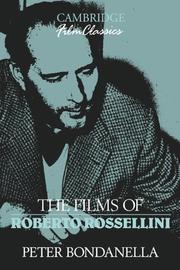
ISBN: 0521392365 0521398665 0511620225 Year: 1993 Publisher: Cambridge : Cambridge University Press,
Abstract | Keywords | Export | Availability | Bookmark
 Loading...
Loading...Choose an application
- Reference Manager
- EndNote
- RefWorks (Direct export to RefWorks)
The Films of Roberto Rossellini traces the career of one of the most influential Italian filmmakers through close analysis of the seven films that mark important turning points in his evolution: The Man with a Cross (1943), Open City (1945), Paisan (1946), The Machine to Kill Bad People (1948-52), Voyage in Italy (1953), General della Rovere (1959) and The Rise to Power of Louis XIV (1966). Beginning with Rossellini's work within the fascist cinema, it discusses his invention of neorealism, a new cinematic style that resulted in several classics during the immediate postwar period. Almost immediately, however, Rossellini's continually evolving style moved beyond mere social realism to reveal other aspects of the camera's gaze, as is apparent in the films he made with Ingrid Bergman during the 1950s; though unpopular, these works had a tremendous impact on the French New Wave critics and directors. Rossellini's late career marks a return to his nonrealist period, now critically reexamined, in such works as the commercially successful General della Rovere, and his eventual turn to the creation of didactic films for television.
Rossellini, Roberto, --- Criticism and interpretation --- Critique et interpétation --- 791.44 --- 791.44.071.1 --- #SBIB:309H1323 --- 791.44.071.1 Filmregisseurs. Cineasten. Filmproducers --- Filmregisseurs. Cineasten. Filmproducers --- 791.44 Filmproductie. Filmindustrie --- Filmproductie. Filmindustrie --- Films met een amusementsfunctie en/of esthetische functie: auteurs --- Critique et interpétation --- Criticism and interpretation. --- Rossellini, Roberto
Book
ISBN: 9780521852098 0521852099 9780511627033 9780521617574 9780511651205 0511651201 9780511579523 0511579527 0511627033 1107196035 052161757X 1282393170 0511647123 9786612393174 0511578784 0511580266 Year: 2009 Publisher: New York : Cambridge University Press,
Abstract | Keywords | Export | Availability | Bookmark
 Loading...
Loading...Choose an application
- Reference Manager
- EndNote
- RefWorks (Direct export to RefWorks)
There is a wealth of critical commentary on Umberto Eco in scholarly books and articles; this collection provides thought-provoking insights into topics that have attracted a great deal of attention in the past without repeating many of the arguments found in earlier publications on Eco. Representing the most active scholars writing on Eco from a variety of disciplinary perspectives, the international panel of authors provides sophisticated engagement with Eco's contributions to a wide range of academic disciplines (semiotics, popular culture, linguistics, aesthetics, philosophy, medieval studies) as well as his literary production of five important novels. From the impact of the detective genre on Eco's literary work to his place as a major medievalist, New Essays on Umberto Eco covers a variety of subjects of interest not only to a wide audience interested in Eco's fiction, but also to the serious student delving into Eco's more esoteric writings.
Semiotics and literature. --- Sémiotique et littérature --- Eco, Umberto --- Criticism and interpretation. --- Literature and semiotics --- Literature --- Arts and Humanities
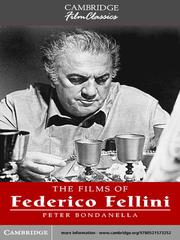
ISBN: 1107113571 1280417072 0511175957 1139145754 0511065728 0511059418 0511323549 0511613342 0511067852 9780511065729 9780511059414 9780511067853 9786610417070 6610417075 0521573254 9780521573252 0521575737 9780521575737 9780511613340 0511090269 9781107113572 9781280417078 9780511175954 9781139145756 9780511323546 Year: 2002 Publisher: Cambridge, UK ; New York, NY, USA : Cambridge University Press,
Abstract | Keywords | Export | Availability | Bookmark
 Loading...
Loading...Choose an application
- Reference Manager
- EndNote
- RefWorks (Direct export to RefWorks)
The Films of Federico Fellini examines the career of one of Italy's most renowned filmmakers through close analysis of five masterpieces that span his career: La Strada, La Dolce Vita, 8 1/2, Amarcord and Interview. Providing an overview of Fellini's early career as a cartoonist and scriptwriter for neorealist directors such as Roberto Rossellini, this study traces the development of Fellini's unique and personal cinematic vision as it transcends Italian neorealism. Rejecting an overtly ideological approach to Fellini's cinema, Bondanella emphasizes the director's interest in fantasy, the irrational and individualism.
Motion pictures --- Motion picture industry --- Biography --- Employees --- Fellini, Federico --- Fellini, Frederico --- Fellini, F. --- Felini, Federiḳo --- פליני, פדריקו --- Fellas, --- Criticism and interpretation.
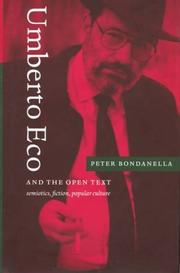
ISBN: 0511581750 051100060X 0585022410 9780585022413 9780511000607 9780521442008 0521442001 0521442001 9780511581755 9780521020879 0521020875 Year: 1997 Publisher: Cambridge New York Cambridge University Press
Abstract | Keywords | Export | Availability | Bookmark
 Loading...
Loading...Choose an application
- Reference Manager
- EndNote
- RefWorks (Direct export to RefWorks)
Umberto Eco is Italy's most famous living intellectual, known among academics for his literary and cultural theories, and to an enormous international audience through his novels, The Name of the Rose, Foucault's Pendulum and The Island of the Day Before. Umberto Eco and the Open Text is the first comprehensive study in English of Eco's work. In clear and accessible language, Peter Bondanella considers not only Eco's most famous texts, but also many occasional essays not yet translated into English. Tracing Eco's intellectual development from early studies in medieval aesthetics to seminal works on popular culture, postmodern fiction, and semiotic theory, he shows how Eco's own fiction grows out of his literary and cultural theories. Bondanella cites all texts in English, and provides a full bibliography of works by and about Eco.
Semiotics and literature --- Literature and semiotics --- Literature --- Eco, Umberto --- Criticism and interpretation. --- 82:003 --- 82.09 --- 850 "19" ECO, UMBERTO --- 850 "19" ECO, UMBERTO Italiaanse literatuur--20e eeuw. Periode 1900-1999--ECO, UMBERTO --- Italiaanse literatuur--20e eeuw. Periode 1900-1999--ECO, UMBERTO --- Semiotiek in de literatuur --- Literaire kritiek --- 82.09 Literaire kritiek --- 82:003 Semiotiek in de literatuur --- Criticism and interpretation --- Eco, Umberto - Criticism and interpretation. --- Arts and Humanities
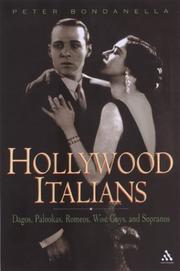
ISBN: 082641544X Year: 2004 Publisher: New York London Continuum
Abstract | Keywords | Export | Availability | Bookmark
 Loading...
Loading...Choose an application
- Reference Manager
- EndNote
- RefWorks (Direct export to RefWorks)
Book
ISBN: 9781844574049 9781844574056 Year: 2013 Publisher: New York ; Basingstoke Palgrave Macmillan
Abstract | Keywords | Export | Availability | Bookmark
 Loading...
Loading...Choose an application
- Reference Manager
- EndNote
- RefWorks (Direct export to RefWorks)
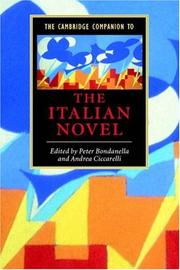
ISBN: 0521669626 0521660181 1139816128 0511999747 Year: 2003 Publisher: Cambridge New York Port Melbourne Cambridge University Press
Abstract | Keywords | Export | Availability | Bookmark
 Loading...
Loading...Choose an application
- Reference Manager
- EndNote
- RefWorks (Direct export to RefWorks)
The Cambridge Companion to the Italian Novel provides a broad ranging introduction to the major trends in the development of the Italian novel from its early modern origin to the contemporary era. Contributions cover a wide range of topics including the theory of the novel in Italy, the historical novel, realism, modernism, postmodernism, neorealism, and film and the novel. The contributors are distinguished scholars from the United Kingdom, the United States, Italy, and Australia. Novelists examined include some of the most influential and important of the twentieth century inside and outside Italy: Luigi Pirandello, Primo Levi, Umberto Eco and Italo Calvino. This is a unique examination of the Italian Novel, and will prove invaluable to students and specialists alike. Readers will gain a keen sense of the vitality of the Italian novel throughout its history and a clear picture of the debates and criticism that have surrounded its development.
Italian fiction --- History and criticism --- History and criticism.
Book
ISBN: 0191604585 Publisher: Oxford Oxford University Press
Abstract | Keywords | Export | Availability | Bookmark
 Loading...
Loading...Choose an application
- Reference Manager
- EndNote
- RefWorks (Direct export to RefWorks)
Book
ISBN: 9780511999741 9780521660181 9780521669627 Year: 2003 Publisher: Cambridge Cambridge University Press
Abstract | Keywords | Export | Availability | Bookmark
 Loading...
Loading...Choose an application
- Reference Manager
- EndNote
- RefWorks (Direct export to RefWorks)
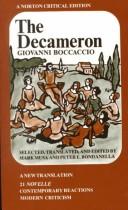
ISBN: 0393044580 Year: 1977 Publisher: New York Norton
Abstract | Keywords | Export | Availability | Bookmark
 Loading...
Loading...Choose an application
- Reference Manager
- EndNote
- RefWorks (Direct export to RefWorks)
| Listing 1 - 10 of 12 | << page >> |
Sort by
|

 Search
Search Feedback
Feedback About UniCat
About UniCat  Help
Help News
News